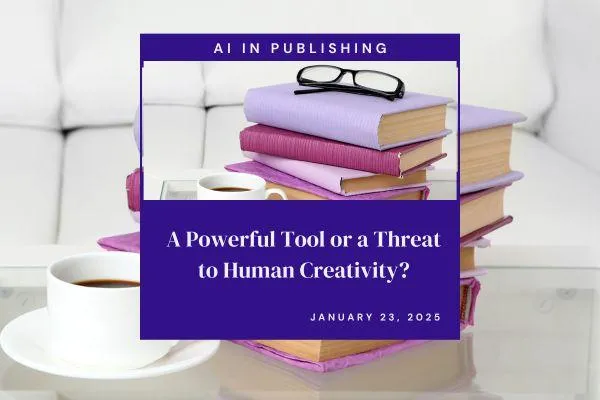Random THoughts
You never know what I might say...

AI in Publishing: A Powerful Tool or a Threat to Human Creativity?
Artificial Intelligence (AI) isn’t just knocking on the door of the writing and publishing industries—it’s already inside, rearranging the furniture. If you’re ignoring AI, you might be the same person who scoffed at cassette tapes replacing vinyl or dismissed eBooks as a passing fad. Whether you welcome AI as an innovative tool or view it as a disruptive force, it’s impossible to ignore how it’s reshaping creativity and the business of storytelling. The question isn’t if AI will impact the industry—it’s how we choose to respond.
The Allure of AI as a Tool
AI tools like Grammarly, ProWritingAid, and even ChatGPT have made their way into writers’ toolkits. These programs can enhance grammar, streamline editing, and even provide creative prompts. For time-strapped authors, these tools are invaluable, acting as a digital assistant to refine their work without replacing their voice. In publishing, AI can analyze market trends, streamline submissions, and even help identify potential bestsellers.
But what happens when AI goes beyond being a tool to becoming a creator?
The Threat of AI-Generated Content
The influx of AI-generated content has created ripples—and not all of them are positive. Publications like Sci-Fi's Clarkesworld Magazine recently faced an onslaught of AI-generated submissions, forcing them to temporarily close their doors to unsolicited works. These submissions weren’t just poor in quality; they posed a challenge to editorial resources and the integrity of human-authored stories.
For authors, this raises a critical question: how do you compete with machines that can churn out thousands of words in minutes? The answer isn’t simple, but it starts with recognizing that true storytelling—rooted in lived experience and emotional depth—can’t be replicated by algorithms.
Copyright and Compensation Concerns
A more contentious issue lies in how AI is trained. Many AI models are built using vast datasets that include copyrighted works, often without the authors’ consent. This has led to lawsuits and public outcry. Writers’ livelihoods are at stake when their hard work is fed into machines that then produce derivative content, sometimes even competing with their original works.
Organizations like the Authors Guild are advocating for stronger protections, calling for transparency and proper licensing agreements that respect authors’ intellectual property. These efforts aim to ensure that creators are fairly compensated when their works are used to train AI systems.
Ethical and Creative Implications
Beyond legalities, the ethical implications of AI-authored books are profound. When AI writes a book, who owns the story? More importantly, what does it say about our values as a society when we’re willing to sideline human creativity for efficiency? Writing isn’t just about stringing words together; it’s about the human experience, the struggles and triumphs that connect us all.
My Stance on AI in Writing
Let me be clear: I’m not anti-AI. I see its potential as a powerful tool to assist writers and publishers in navigating an increasingly competitive industry. But I draw a hard line at AI taking the place of authors. A book should reflect the soul of its creator, the nuance of human thought, and the depth of real emotion—qualities no algorithm can replicate.
So, while I’m fine with using AI to polish a manuscript or generate market insights, I firmly believe the act of writing a book should remain a distinctly human endeavor. After all, literature is a mirror of our humanity, and that’s something no machine can replicate.
Final Thoughts
As we continue to explore AI’s role in writing and publishing, it’s crucial to ask hard questions and demand clear boundaries. What kind of creative world do we want to build? One where machines churn out stories devoid of soul? Or one where humans, aided by tools, craft narratives that inspire, challenge, and connect us?
The choice is ours, and it starts with how we use—and limit—AI in our creative processes.
© Copyright 2025. KLR Literary Management. All rights reserved. | Privacy Policy | Terms of Use

